Prof. Ranabir Samaddar is the director of the Calcutta Research Group and conducts research on migration and flight, the theory and practice of dialogue, nationalism and post-colonial statehood in South Asia, and new regimes of technological restructuring and labour control.
Quote Category: Migration
Migration, mobility and refugees are categories and concepts that have been used since the 20th century to describe the permanent, temporary, voluntary or forced mobility of social groups, individuals and workers. We distinguish between transnational migration and internal migration, where migrants remain in the same nation state. The latter still represents by far the greatest share of global migration in terms of quantity. In general, humans have been moving from their traditional places of life and settlement throughout history. Refugee and migrant movements are already described in the Old Testament. Before the Mesolithic Era, humans were permanent migrants. Humans only settled down around 12,000 years ago. However, one could not use the category of migration in relation to the Mesolithic Era. This is because it was state regulation of migration and the social norms that accompanied it together with the development of colonial regimes that forged modern understandings of migration. Within the international state system and the global division of labour, migration has become a contested social practice, whose representation moves between two poles: that of the autonomy of the migrant versus national and international regulation.
In the timeline on migration and flight, we address the following questions:
*What has motivated people to migrate?
*What are the most common reasons for migration?
*What have been the consequences of migration for migrants?
*What have been the consequences of migration for host societies?
*How is migration linked to one’s origins (from the Global North or South), and to gender, class and other power structures?
*What are the differences between population movements from the Global North to the Global South and vice versa?
Unfortunately wrong answer
Try again!
The answer was
Read the solution on the "line with the dots" (there where you can re-read all the quotes)
OK
Europe is not situated outside the postcolonial world. Colonial history still forms transfer of resources, neo-colonial domination, creditor-debtor relation, labour migration, imposition of wars on ex-colonies, etc.). Migration shows that the distance between the erstwhile colonised country and the colonial power is not great. People are coming to Europe. And it is a history of power. Europe does not have colonies any more but there is the whole question of neocolonialism, which is an integral part of global neoliberal capitalism.
Correct!
Europe is not situated outside the postcolonial world. Colonial history still forms transfer of resources, neo-colonial domination, creditor-debtor relation, labour migration, imposition of wars on ex-colonies, etc.). Migration shows that the distance between the erstwhile colonised country and the colonial power is not great. People are coming to Europe. And it is a history of power. Europe does not have colonies any more but there is the whole question of neocolonialism, which is an integral part of global neoliberal capitalism.
Year:
Author Bio:
Source:
*Ranabir Samaddar (2017, in German): Die Krise des Kapitalismus bedeutet nicht das Ende des Kapitalismus. In: glokal e.V. (Hrsg.): Connecting the dots. Lernen aus Geschichte(n) von Unterdrückung und Widerstand, p. 72.
Context:
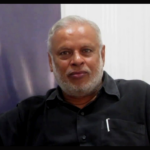 Samaddar is posing a central question in current debates: how can one grasp the historical and global dimensions of migration? How does the global division of the world relate to neo-colonial relationships of dependency? Does migration only move from the Global South to the Global North, as an attempt to escape from the effects of global patterns of dependency? Does it in this way propel the realities of post-colonial exploitation and oppression into Europe’s “white field of vision”? Wars are mostly take place in the Global South. Poverty, hunger and drought, on the other hand, are not social phenomena that can be explained purely in local and regional terms. Their relationship with global capitalist contexts, in which the Global North continues to be hegemonic, is patent. The wars in the Global South are being waged with weapons made in the Global North. Debt in the Global South leads to profits and economic power in the Global North. Samaddar’s position is key to the argument for a global understanding of responsibility, which perspective is currently insufficiently reflected in debates about migration.
Samaddar is posing a central question in current debates: how can one grasp the historical and global dimensions of migration? How does the global division of the world relate to neo-colonial relationships of dependency? Does migration only move from the Global South to the Global North, as an attempt to escape from the effects of global patterns of dependency? Does it in this way propel the realities of post-colonial exploitation and oppression into Europe’s “white field of vision”? Wars are mostly take place in the Global South. Poverty, hunger and drought, on the other hand, are not social phenomena that can be explained purely in local and regional terms. Their relationship with global capitalist contexts, in which the Global North continues to be hegemonic, is patent. The wars in the Global South are being waged with weapons made in the Global North. Debt in the Global South leads to profits and economic power in the Global North. Samaddar’s position is key to the argument for a global understanding of responsibility, which perspective is currently insufficiently reflected in debates about migration.
Further Reading:
Ranabir Samaddar (2020): The Postcolonial Age of Migration. New Delhi: Routledge.
OK
These migrants are like cockroaches. They might look a bit ‘Bob Geldof’s Ethiopia circa 1984’, but they are built to survive a nuclear bomb.
Correct!
These migrants are like cockroaches. They might look a bit ‘Bob Geldof’s Ethiopia circa 1984’, but they are built to survive a nuclear bomb.
Year:
Author Bio:
Katie Hopkins (born 1975) is a British journalist publishing in the newspapers The Sun, Daily Mail and others.
Source:
From the daily The Sun, quoted in The Guardian, 19. April 2015.
Context:
 Katie Hopkins has been fined numerous times for making discriminatory and racist statements, including this one. Such statements form part of a routine strategy by right-wing populist groups, who aim to influence public opinion by repeatedly breaking taboos around middle class and liberal-democratic common sense. By doing so, they attempt to normalise right-wing ideas within public discourse. In this quote, migration is constructed as posing an extremely high risk along with great uncertainty.
Katie Hopkins has been fined numerous times for making discriminatory and racist statements, including this one. Such statements form part of a routine strategy by right-wing populist groups, who aim to influence public opinion by repeatedly breaking taboos around middle class and liberal-democratic common sense. By doing so, they attempt to normalise right-wing ideas within public discourse. In this quote, migration is constructed as posing an extremely high risk along with great uncertainty.
Further Reading:
*Zoe Williams (2015): Katie Hopkins calling migrants vermin recalls the darkest events of history.
OK
At first I told everyone I was from Trinidad so I wouldn’t have to talk about Sri Lanka and the war. I didn’t want to say that I am a refugee.
Correct!
At first I told everyone I was from Trinidad so I wouldn’t have to talk about Sri Lanka and the war. I didn’t want to say that I am a refugee.
Year:
Author Bio:
Mathangi “Maya” Arulpragasam, short, M.I.A. (born in 1975) is a British singer and music producer. M.I.A. stands for both Missing in Action and Missing in Acton.
Source:
Frank Sawatzki (2005): Maya rennt.
Context:
 Refugees often spend multiple years migrating before they reach their destination country. Because of the struggle for survival that the border regime imposes, refugees from war zones may not be able to find the space to heal the emotional trauma that they carry (experiences of war, rape, loss of family members). On the contrary: the violence and lack of shelter – especially for women – often continue in the country of arrival. In many countries, however, there are self-organised psychiatric care centres that provide assistance in dealing with psychological trauma.
Refugees often spend multiple years migrating before they reach their destination country. Because of the struggle for survival that the border regime imposes, refugees from war zones may not be able to find the space to heal the emotional trauma that they carry (experiences of war, rape, loss of family members). On the contrary: the violence and lack of shelter – especially for women – often continue in the country of arrival. In many countries, however, there are self-organised psychiatric care centres that provide assistance in dealing with psychological trauma.
Further Reading:
*Grada Kilomba (2021): Plantation Memories: Episodes of Everyday Racism. Tkaronto: Between the Lines Publishers.
OK
Where today are the Pequot? Where are the Narragansett, the Mohican, the Pocanet, and other powerful tribes of our people? They have vanished before the avarice and oppression of the white man, as snow before the summer sun… Will we let ourselves be destroyed in our turn, without making an effort worthy of our race? Shall we without a struggle, give up our homes, our lands, bequeathed to us by the Great Spirit? The graves of our dead and everything that is dear and sacred to us? I know you will say with me, Never! Never!
Correct!
Where today are the Pequot? Where are the Narragansett, the Mohican, the Pocanet, and other powerful tribes of our people? They have vanished before the avarice and oppression of the white man, as snow before the summer sun… Will we let ourselves be destroyed in our turn, without making an effort worthy of our race? Shall we without a struggle, give up our homes, our lands, bequeathed to us by the Great Spirit? The graves of our dead and everything that is dear and sacred to us? I know you will say with me, Never! Never!
Year:
Author Bio:
Tecumseh Shawnee (1768-1813) was a fighter and leader of the Shawnee in what is today’s Ohio in the USA. He was known as a powerful speaker, and for his ability to bring together diverse groups.
Source:
Quoted in Alex Alvarez (2016): Native Americans and the Question of Genocide. Lanham: Rowman; Littlefield, p. 9. The quote could be also from 1813.
Context:
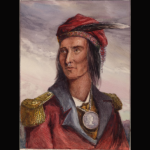 After the American War of Independence at the end of the 18th century, a new immigration policy was rolled out. This liberally oriented migration regime wanted to allow migration from Europe. This contrasted with the enslavement of people from Africa, and the expulsions, genocides and expropriations against Native Americans. Through numerous armed conflicts, Native Americans defended themselves against European settler colonisation and its land expropriation and genocidal policies. The victorious settlers created reservations for indigenous peoples. During the 18th century, Tecumseh persevered in his attempt to form a broad alliance against the white settlers. In this quote, in which he mourns his contemporaries, the traumatic brutality of the genocide of the Native Americans is clear.
After the American War of Independence at the end of the 18th century, a new immigration policy was rolled out. This liberally oriented migration regime wanted to allow migration from Europe. This contrasted with the enslavement of people from Africa, and the expulsions, genocides and expropriations against Native Americans. Through numerous armed conflicts, Native Americans defended themselves against European settler colonisation and its land expropriation and genocidal policies. The victorious settlers created reservations for indigenous peoples. During the 18th century, Tecumseh persevered in his attempt to form a broad alliance against the white settlers. In this quote, in which he mourns his contemporaries, the traumatic brutality of the genocide of the Native Americans is clear.
Further Reading:
*Vine Deloria (1969): Custer Died for your Sins. An Indian Manifesto. New York: Macmillan.
OK
Most important of all (…) it is necessary to make some estimate of the number of people killed and injured so as to extract the millions who were taken alive and sound. The resultant figure would be many times the millions landed alive outside of Africa, and it is that figure which represents the number of Africans directly removed from the population and labour force of Africa because of the establishment of slave production by Europeans.
Correct!
Most important of all (…) it is necessary to make some estimate of the number of people killed and injured so as to extract the millions who were taken alive and sound. The resultant figure would be many times the millions landed alive outside of Africa, and it is that figure which represents the number of Africans directly removed from the population and labour force of Africa because of the establishment of slave production by Europeans.
Year:
Author Bio:
Walter Rodney (1942-1980) was a Marxist historian and politician from Guyana. Rodney was born into a working class family, studied in Guyana and Jamaica and taught in Hamburg and Tanzania, amongst other places. In 1980 he was killed in a bomb attack while campaigning for the Working People’s Alliance. In all likelihood, the then Forbes Burnham administration was responsible for the murder.
Source:
Walter Rodney (1973: 96)
Context:
 Rodney claims that a) the transatlantic abduction and forced enslavement of millions of Africans to Europe and America, b) economic exploitation and c) political colonial power resulted in the systematic underdevelopment of Africa. His book was enormously influential in efforts to develop a new anti-colonial perspective within historiography. Rodney’s book concludes with the statement that the only humanistic way to liberate and develop Africa would be to end the neo-colonial regime.
Rodney claims that a) the transatlantic abduction and forced enslavement of millions of Africans to Europe and America, b) economic exploitation and c) political colonial power resulted in the systematic underdevelopment of Africa. His book was enormously influential in efforts to develop a new anti-colonial perspective within historiography. Rodney’s book concludes with the statement that the only humanistic way to liberate and develop Africa would be to end the neo-colonial regime.
Further Reading:
*Walter Rodney (1973): How Europe Underdeveloped Africa. London & Dar-Es-Salaam: Bogle-L’Ouverture Publications.
OK
The German Reich must strive to acquire colonies. In the realm itself there is too little space for the large population. It is precisely the somewhat daring, strongly advancing elements that could not be active in the country themselves, but find a field for their activity in the colonies, that are constantly being lost to us. We need more space for our people, and therefore, we must have colonies.
Correct!
The German Reich must strive to acquire colonies. In the realm itself there is too little space for the large population. It is precisely the somewhat daring, strongly advancing elements that could not be active in the country themselves, but find a field for their activity in the colonies, that are constantly being lost to us. We need more space for our people, and therefore, we must have colonies.
Year:
Author Bio:
Konrad Adenauer (1876-1967) was the first Chancellor of the Federal German Republic from 1949-1963.
Source:
Horst Gründer (1999): „… da und dort ein junges Deutschland gründen“. Rassismus, Kolonien und kolonialer Gedanke vom 16. bis 20. Jahrhundert. München: Deutscher Taschenbuch Verlag, p. 327.
Context:
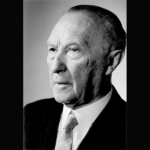 Konrad Adenauer is known as the first Federal Chancellor of Germany after the Second World War. But he was also deputy president of the German Colonial Society from 1931 to 1932. This statement on the German Empire’s colonial policy was made during his official activity as Mayor of Cologne. The ideology of the “people without space” underlay the pursuit of settler colonisation and emigration after the First World War. Before that, in the immediate aftermath of the war, the victorious powers had taken over German “protected areas” and accused the Germans of both incompetent and particularly violent colonisation practices. The Allies wanted to limit “Wilhelmine imperialism”, for which reason they agitated aggressively against the so-called “lie of colonial guilt”.
Konrad Adenauer is known as the first Federal Chancellor of Germany after the Second World War. But he was also deputy president of the German Colonial Society from 1931 to 1932. This statement on the German Empire’s colonial policy was made during his official activity as Mayor of Cologne. The ideology of the “people without space” underlay the pursuit of settler colonisation and emigration after the First World War. Before that, in the immediate aftermath of the war, the victorious powers had taken over German “protected areas” and accused the Germans of both incompetent and particularly violent colonisation practices. The Allies wanted to limit “Wilhelmine imperialism”, for which reason they agitated aggressively against the so-called “lie of colonial guilt”.
Further Reading:
DW (22.09.2021): Namibia: A timeline of Germany’s brutal colonial history.
OK
We have now to deal with another people, small and feeble when our forefathers first met with them, but now great and overbearing. Strangely enough, they have a mind to till the soil, and the love of possessions is a disease in them. These people have made many rules that the rich may break, but the poor may not! They have a religion in which the poor worship, but the rich will not! They even take tithes of the poor and weak to support the rich and those who rule.
Correct!
We have now to deal with another people, small and feeble when our forefathers first met with them, but now great and overbearing. Strangely enough, they have a mind to till the soil, and the love of possessions is a disease in them. These people have made many rules that the rich may break, but the poor may not! They have a religion in which the poor worship, but the rich will not! They even take tithes of the poor and weak to support the rich and those who rule.
Year:
Author Bio:
Sitting Bull (ca. 1831-1890) whose actual name was Tȟatȟáŋka Íyotake. He was a leader and healer of the Hunkpapa Lakota Sioux.
Source:
Bob Blaisdell (2014): The Dover Anthology of American Literature. From 1865 to 1922. p. 77.
Context:
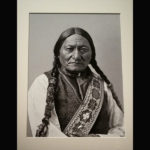 Today’s USA was populated by European migrants as a settler colony. Here, Sitting Bull was speaking as a Native American about the experience of genocidal policies during that colonisation. The Sioux leader, who is admired to this day, mourned the dispossession of the Native Americans. At the same time, through the analysis it presents, the quote also provides information about how Sitting Bull perceived and analysed settlement policies, mass murder and wars, as well as the new culture that was brought to his country with the white man.
Today’s USA was populated by European migrants as a settler colony. Here, Sitting Bull was speaking as a Native American about the experience of genocidal policies during that colonisation. The Sioux leader, who is admired to this day, mourned the dispossession of the Native Americans. At the same time, through the analysis it presents, the quote also provides information about how Sitting Bull perceived and analysed settlement policies, mass murder and wars, as well as the new culture that was brought to his country with the white man.
Further Reading:
*Dee Brown (1970): Bury My Heart at Wounded Knee. An Indian History of the American West. New York: Holt, Rinehart & Winston.
OK
We have given jobs to every family that has lost their homes and land to the Dock Complex.
Correct!
We have given jobs to every family that has lost their homes and land to the Dock Complex.
Year:
Author Bio:
M.L. Meena (birthdate unknown) was Deputy Chairman of the Haldia Dock Complex in Calcutta, India.
Source:
Quoted in Samata Biwas (2016): Haldia: Logistics and its Other(s). Workshop-paper Kolkata Research Group.
Context:
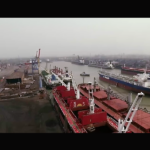 A lot of migration also takes place within states. When India freed itself from British colonial rule in 1947, the former colony was divided into the independent states of India and Pakistan. “For more than ten million people on both sides of the new border, this was tantamount to resettlement, flight and expulsion” (Federal Agency for Civic Education (2014): The Partition of British India 1947). Other forced migrations take place because of so-called development projects. The quote comes from the Kolkatta area of West Bengal, where many people were dispossessed for the construction of the dock and harbour complex. Many have been waiting for compensation for decades.
A lot of migration also takes place within states. When India freed itself from British colonial rule in 1947, the former colony was divided into the independent states of India and Pakistan. “For more than ten million people on both sides of the new border, this was tantamount to resettlement, flight and expulsion” (Federal Agency for Civic Education (2014): The Partition of British India 1947). Other forced migrations take place because of so-called development projects. The quote comes from the Kolkatta area of West Bengal, where many people were dispossessed for the construction of the dock and harbour complex. Many have been waiting for compensation for decades.
Further Reading:
*Samata Biswas (2017): Haldia, A Port City in India.
*Kalim Siddiqui (2012): Development and Displacement in India: Reforming the
Economy towards Sustainability.
OK
Three daughters, two sons. Who did you leave them with as you left? Such a beautiful home. You set it on fire and left. You would have married there. Seven years have passed and you haven’t come home. You send some money. For whom is the money supposed to be of use? Your family with five children, all of them are only looking for you.
Correct!
Three daughters, two sons. Who did you leave them with as you left? Such a beautiful home. You set it on fire and left. You would have married there. Seven years have passed and you haven’t come home. You send some money. For whom is the money supposed to be of use? Your family with five children, all of them are only looking for you.
Year:
Author Bio:
This text is one of the first popular migration songs that accompanied the labour migration from the Black Sea region to Europe, which was beginning at the time. In 1977 the musicians Ruhi Su (1912-1985) and Sümeyra Çakir (1946-1990) released the album “Kapıları” (Foreign Countries) together with the “Dostlar Korosu” (Friends’ Choir). Sümeyra died in political exile in Frankfurt. In 1980, she sang the Communist International at a concert in West Berlin by the (Turkish-speaking) West Berlin Workers’ Choir, which brought politically organised migrant workers together around music. After this concert, she had to stay in Germany and in Turkey before the state repression after the military coup in 1980 flee.
Source:
Quoted from Ceren Turkmen, original source Ruhi Su; Sümeyra Çakir (1977): “El Kapıları”, Imece Plaklari: Istanbul, Vinyl, LP. music album. The year (1960) indicates the approximate date of origin.
Context:
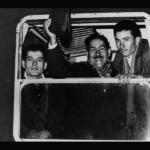 Diasporic workers’ choirs across Europe turned the song “Almanya (Germany), bitter home” into a hidden anthem which achieved cult status, and was sung at major political events as well as everyday cultural club gatherings. For more than 20 years, the song symbolised a cultural practice of migration that was determined by a “nostalgic migration narrative”. This narrative, which was also common in diasporic communist-socialist workers’ choirs, also masculinised migration dynamics. Despite regional differences, the song ignores female labour migration to Europe, which has been central since the 1950s, as well as female wage labour (in family farming, in semi-economised agriculture and in factories) in Turkey.
Diasporic workers’ choirs across Europe turned the song “Almanya (Germany), bitter home” into a hidden anthem which achieved cult status, and was sung at major political events as well as everyday cultural club gatherings. For more than 20 years, the song symbolised a cultural practice of migration that was determined by a “nostalgic migration narrative”. This narrative, which was also common in diasporic communist-socialist workers’ choirs, also masculinised migration dynamics. Despite regional differences, the song ignores female labour migration to Europe, which has been central since the 1950s, as well as female wage labour (in family farming, in semi-economised agriculture and in factories) in Turkey.
Further Reading:
Deutsche Welle (2021): The German-Turkish Recruitment Agreement 60 years on.
OK
[I stress my support for] preventing the introduction of aliens to destroy the purity of the Australian people.
Correct!
[I stress my support for] preventing the introduction of aliens to destroy the purity of the Australian people.
Year:
Author Bio:
Andrew Fisher (1862-1928) was Australian Prime Minister from 1908-1909.
Source:
Andrew Fisher (1910): Election Speeches. Australian Labour Party.
Context:
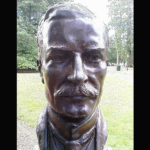 Australia is also settler colony. Around 1788 the first British ship landed in Australia, which at that time was inhabited exclusively by Aboriginal peoples. The conquest and land grab of Australia proceeded rapidly. Local white Australians aspired to independence, which led to the founding of the Australian Confederation in 1901. This statement makes it clear how quickly distortion can occur: white Australians had only recently and violently migrated to the country, and shortly thereafter had developed xenophobic attitudes towards other migrants. They imagined the country’s “white purity” being threatened by foreigners and tried to legislate it into being through the aggressive “White Australia Policy”.
Australia is also settler colony. Around 1788 the first British ship landed in Australia, which at that time was inhabited exclusively by Aboriginal peoples. The conquest and land grab of Australia proceeded rapidly. Local white Australians aspired to independence, which led to the founding of the Australian Confederation in 1901. This statement makes it clear how quickly distortion can occur: white Australians had only recently and violently migrated to the country, and shortly thereafter had developed xenophobic attitudes towards other migrants. They imagined the country’s “white purity” being threatened by foreigners and tried to legislate it into being through the aggressive “White Australia Policy”.
Further Reading:
*Philip Gavin Griffiths (2006): The Making of White Australia: Ruling Class Agendas, 1876-1888. Doctoral Thesis. The Australian National University.
OK
For months, German media commented extensively on developments and events relating to the refugee issue. Most of these commentators were white journalists, politicians, migration researchers, or volunteers. The voices of refugees always sounded more of a marginal note. In the rare cases in which they were allowed to have their say, they were only given a few lines or, at best, seconds. In narratives about them, refugees serve primarily to affirm majority society’s consensus about them. They are not narrators, but objects in the story which is being told.
Correct!
For months, German media commented extensively on developments and events relating to the refugee issue. Most of these commentators were white journalists, politicians, migration researchers, or volunteers. The voices of refugees always sounded more of a marginal note. In the rare cases in which they were allowed to have their say, they were only given a few lines or, at best, seconds. In narratives about them, refugees serve primarily to affirm majority society’s consensus about them. They are not narrators, but objects in the story which is being told.
Year:
Author Bio:
Sinthujan Varatharajah (born 1985) is a political geographer based in Berlin.
Source:
Sinthujan Varatharajah (2015): Das Selbstgespräch brechen: Perspektiven auf Asyl von ehemaligen Geflüchteten.
Context:
 In 2015, refugee and migrant movements to Europe reached a peak. The borders remained closed, which led to the deaths of countless people on the dangerous routes of the Mediterranean and in transit countries. Movements from below were formed, which self-organised to provide support at sea, in countries of origin, transit and arrival. Those participating in them included migrant organisations, NGOs, volunteers, church members, doctors and journalists. The strict border regime policy experienced a historic rupture when Angela Merkel briefly opened the borders. The refugee issue became very prominent in the media. In this context, Sinthujan Varatharajah made the charge that the focus was on white people and that the voices of refugees were rarely heard.
In 2015, refugee and migrant movements to Europe reached a peak. The borders remained closed, which led to the deaths of countless people on the dangerous routes of the Mediterranean and in transit countries. Movements from below were formed, which self-organised to provide support at sea, in countries of origin, transit and arrival. Those participating in them included migrant organisations, NGOs, volunteers, church members, doctors and journalists. The strict border regime policy experienced a historic rupture when Angela Merkel briefly opened the borders. The refugee issue became very prominent in the media. In this context, Sinthujan Varatharajah made the charge that the focus was on white people and that the voices of refugees were rarely heard.
Further Reading:
Sinthujan Varatharajah (2014): The Walls the West Won’t Tear Down.
OK
(…) the refugees have to be thrown out, and the farmers have to help out.
Correct!
(…) the refugees have to be thrown out, and the farmers have to help out.
Year:
Author Bio:
Jakob Fischbacher (1886-1972) founded the Bavarian Party in 1946, which saw itself as a meeting place for conservatives and separatists for an independent Bavaria. Central to the party’s project was defence against German refugees from the East.
Source:
Der Spiegel 16/1947: Preußen-Attacke.
Context:
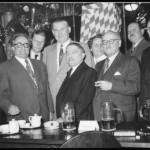 After the Second World War, there was not only transnational migration, but large parts of the population also migrated within the new states. In Germany, 14 million expelled Germans migrated west from the eastern areas occupied during fascism, and from former parts of Germany. In Bavaria in the years up to 1950, the population increased by almost 30%. Although the Eastern refugees were included in the “völkisch” notion of German identity, they were vehemently repelled for reasons of radical redistribution. Andreas Schachner of the Bavarian Party said that so many foreigners were using Bavarian mangers “that pogroms would be necessary to restore justice” (Hoefer 2015). These slogans are echoed in current discussions that have accompanied the movements of refugees and migrants to Europe since the early 2010s.
After the Second World War, there was not only transnational migration, but large parts of the population also migrated within the new states. In Germany, 14 million expelled Germans migrated west from the eastern areas occupied during fascism, and from former parts of Germany. In Bavaria in the years up to 1950, the population increased by almost 30%. Although the Eastern refugees were included in the “völkisch” notion of German identity, they were vehemently repelled for reasons of radical redistribution. Andreas Schachner of the Bavarian Party said that so many foreigners were using Bavarian mangers “that pogroms would be necessary to restore justice” (Hoefer 2015). These slogans are echoed in current discussions that have accompanied the movements of refugees and migrants to Europe since the early 2010s.
Further Reading:
*Carsten Hoefer (2015): “Die Flüchtlinge müssen hinausgeworfen werden.”
OK
no one leaves home unless. home is the mouth of a shark. you only run for the border. when you see the whole city running as well.
Correct!
no one leaves home unless. home is the mouth of a shark. you only run for the border. when you see the whole city running as well.
Year:
Author Bio:
Warsan Shire (born 1988 in Kenya) is a Somali-British author.
Source:
Warsan Shire (2011): Teaching My Mother How to Give Birth. UK: Flipped Eye Publishing.
Context:
 Warsan Shire deals with flight and migration experiences in a literary way. In the poem from which the quote comes, motives, ambivalences, conflicts, hopes, feelings of guilt, the spirit of optimism, partings and other emotional states are named and given as reasons for migration. The poem is a subjective report from an emancipated and self-determined perspective, which recounts the decision to flee and documents the migration process from a first-person perspective.
Warsan Shire deals with flight and migration experiences in a literary way. In the poem from which the quote comes, motives, ambivalences, conflicts, hopes, feelings of guilt, the spirit of optimism, partings and other emotional states are named and given as reasons for migration. The poem is a subjective report from an emancipated and self-determined perspective, which recounts the decision to flee and documents the migration process from a first-person perspective.
Further Reading:
*glokal e.V. (2017): Willkommen ohne Paternalismus. Hilfe und Solidarität in der Unterstützungsarbeit. Berlin.
OK
By far the best thing to do is to protect the borders in such a way that they cannot come in the first place. Closing the borders, that would be the best solution. You should give those who are rejected a package for the return trip. This would save both sides from violence. (…) So it would be best to get these unfortunate people out of where they came from as soon and as humanely as possible.
Correct!
By far the best thing to do is to protect the borders in such a way that they cannot come in the first place. Closing the borders, that would be the best solution. You should give those who are rejected a package for the return trip. This would save both sides from violence. (…) So it would be best to get these unfortunate people out of where they came from as soon and as humanely as possible.
Year:
Author Bio:
Golo Mann (1909–1994) was a German-Swiss historian, publicist and writer. He was the son of Thomas Mann, the Nobel prize winner for literature, who had had to leave Germany when the Nazis took power in 1933.
Source:
Bildzeitung from 30. January 1991, quoted from Ulrich Herbert (2001: 305).
Context:
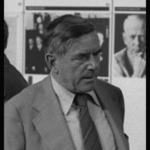 Golo Mann’s defensive attitude towards migrants represents the practice of German foreigner policy since the end of the guest worker agreement in 1973. At the time the quote was written, the deadly arson attacks on migrants and their houses in East and West Germany began: Rostock, Lichtenhagen, Hoyerswerda, Mölln , Solingen. In all cases, the state in East and West Germany failed to provide adequate protection for the victims or a dignified expression of condolences. In debates, it is argued that one can see from the attacks that the Germans have exceeded their resilience limit and that the right to asylum must therefore be abolished. Finally, the right to asylum was radically curtailed by the CDU, CSU and FDP in 1993 with the consent of the SPD.
Golo Mann’s defensive attitude towards migrants represents the practice of German foreigner policy since the end of the guest worker agreement in 1973. At the time the quote was written, the deadly arson attacks on migrants and their houses in East and West Germany began: Rostock, Lichtenhagen, Hoyerswerda, Mölln , Solingen. In all cases, the state in East and West Germany failed to provide adequate protection for the victims or a dignified expression of condolences. In debates, it is argued that one can see from the attacks that the Germans have exceeded their resilience limit and that the right to asylum must therefore be abolished. Finally, the right to asylum was radically curtailed by the CDU, CSU and FDP in 1993 with the consent of the SPD.
Further Reading:
*Ulrich Herbert (2001): Geschichte der Ausländerpolitik in Deutschland. München: C.H. Beck.
*Politics Today (06.06.2018): What Changed 25 Years After the Solingen Arson Attack.
OK
After two weeks we were sent to the comfort station. It was a wooden barracks with up to six separate rooms (…). The rooms were tiny, with sheets and blankets on the wooden floors. Soldiers kept coming and going – even after midnight.
Correct!
After two weeks we were sent to the comfort station. It was a wooden barracks with up to six separate rooms (…). The rooms were tiny, with sheets and blankets on the wooden floors. Soldiers kept coming and going – even after midnight.
Year:
Author Bio:
Hwang Kum-Ju (born ca. in 1920) was a Korean forced into prostitution in a brothel for Japanese soldiers. She had been promised work in a factory, but was instead deported to Manchuria.
Source:
Quoted in Rheinisches JournalistInnenbüro; recherche international e.V. (2008: 111). Original from Hwang Kum-Ju (2002/2003): Script for the Korean Council for the rehabilitation for victims of violence during WWII as well as Interviews on 20.10.2002 and 03.12.2003, Seoul. The Year (2002) is an approximation.
Context:
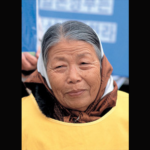 Forced migration in Asia is often associated with Japanese colonial rule. By 1910, Korea had been fully colonised by Japan, with colonial rule ending in 1945 with the end of World War II and Japan’s surrender. During World War II, Korean women were abducted and enslaved as forced prostitutes for the Japanese army. According to estimates by Asian NGOs, between 1932 and 1945 the Imperial Japanese Army abducted a total of 200,000 women from Korea, China, the Philippines, Malaya, Burma, East Timor and Indonesia and sent them to work in military brothels. In 1991, the Korean Council was formed to investigate the sexual abuse of conscripted women by the Japanese military. In 1993, the Japanese government apologised, but rejected claims for compensation (Rheinische Journalistinnenbüro & recherche international e.V. 2008: 109).
Forced migration in Asia is often associated with Japanese colonial rule. By 1910, Korea had been fully colonised by Japan, with colonial rule ending in 1945 with the end of World War II and Japan’s surrender. During World War II, Korean women were abducted and enslaved as forced prostitutes for the Japanese army. According to estimates by Asian NGOs, between 1932 and 1945 the Imperial Japanese Army abducted a total of 200,000 women from Korea, China, the Philippines, Malaya, Burma, East Timor and Indonesia and sent them to work in military brothels. In 1991, the Korean Council was formed to investigate the sexual abuse of conscripted women by the Japanese military. In 1993, the Japanese government apologised, but rejected claims for compensation (Rheinische Journalistinnenbüro & recherche international e.V. 2008: 109).
Further Reading:
*Rheinisches JournalistInnenbüro & recherche international e.V. (2008): Die dritte Welt im Zweiten Weltkrieg. Unterrichtsmaterialien zu einem vergessenen Kapitel der Geschichte.
*Björn Jensen (2015): Forgotten Sex Slaves – Comfort Women in the Philippines. Dokumentarfilm, 46min.
OK
And of course the approach was to say, now let’s do multiculturalism and live side by side. This approach has failed, absolutely failed!
Correct!
And of course the approach was to say, now let’s do multiculturalism and live side by side. This approach has failed, absolutely failed!
Year:
Author Bio:
Chancellor Angela Merkel (born 1954) is a politician of the CDU and was Chancellor of the Federal Republic of Germany from 2005-2021. She was the first woman to hold this post.
Source:
Speech in front of the Young Members of the CDU
Context:
 As chancellor, Angela Merkel made integration a top priority. “Germans with a migration background” caught the media’s attention because of reports on poverty, social inequality in schools, the labour market and so on. The right-wing conservative camp quickly spoke of self-inflicted poverty and the failure of the “multicultural” approach. Angela Merkel initially relied on state integration policy, for example, seting up the German Islam Conference and Integration Summit which has been held every year since 2006. In the same year as the quote, the former SPD politician Thilo Sarrazin published his book Germany Abolishes Itself. CSU chairman Horst Seehofer referred positively to Sarrazin’s idea of a dominant culture. In this statement, Angela Merkel was supporting Seehofer and an authoritarian integration project.
As chancellor, Angela Merkel made integration a top priority. “Germans with a migration background” caught the media’s attention because of reports on poverty, social inequality in schools, the labour market and so on. The right-wing conservative camp quickly spoke of self-inflicted poverty and the failure of the “multicultural” approach. Angela Merkel initially relied on state integration policy, for example, seting up the German Islam Conference and Integration Summit which has been held every year since 2006. In the same year as the quote, the former SPD politician Thilo Sarrazin published his book Germany Abolishes Itself. CSU chairman Horst Seehofer referred positively to Sarrazin’s idea of a dominant culture. In this statement, Angela Merkel was supporting Seehofer and an authoritarian integration project.
Further Reading:
The Guardian (30.08.2010): Bundesbank executive provokes race outcry with book.
OK
Few of their children in the Country learn English; they import many Books from Germany; (…) they will soon so out number us, that all the advantages we have will not in My Opinion be able to preserve our language, and even our Government will become precarious.
Correct!
Few of their children in the Country learn English; they import many Books from Germany; (…) they will soon so out number us, that all the advantages we have will not in My Opinion be able to preserve our language, and even our Government will become precarious.
Year:
Author Bio:
Benjamin Franklin (1706-1790) was an American writer, scientist, inventor, and politician. He was one of the authors of the US Declaration of Independence.
Source:
Letter from Benjamin Franklin to Peter Collinson: The Support of the Poor, 9th May 1753.
Context:
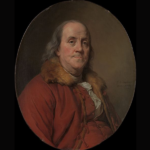 In the middle of the 18th century, the first important political discourses on independence developed in the colonies of North America. Wars and conflicts raged in Europe, and these culminated in the Seven Years’ War between 1756 and 1763. This made the colonies in America even more important for the finances of the indebted and war-mongering colonial regimes in Europe. The British increased taxes on tea and sugar in the British colonies. A few years later, in 1774, the separatist Boston Tea Party was founded and in 1775, the American War of Independence broke out. In this statement, Benjamin Franklin was complaining about the unwillingness of German migrants to integrate; he feared the establishment of a parallel German society.
In the middle of the 18th century, the first important political discourses on independence developed in the colonies of North America. Wars and conflicts raged in Europe, and these culminated in the Seven Years’ War between 1756 and 1763. This made the colonies in America even more important for the finances of the indebted and war-mongering colonial regimes in Europe. The British increased taxes on tea and sugar in the British colonies. A few years later, in 1774, the separatist Boston Tea Party was founded and in 1775, the American War of Independence broke out. In this statement, Benjamin Franklin was complaining about the unwillingness of German migrants to integrate; he feared the establishment of a parallel German society.
Further Reading:
*Eske Wollrad (2005): Weißsein im Widerspruch. Feministische Perspektiven auf Rassismus, Kultur und Religion. Königstein im Taunus.: Ulrike Helmer.
OK
What are you doing here, my comrade? Ding Ding. Who brought you here through evil betrayal? Ding Ding. Is that the boat that betrayed you? Ding Ding. Or was it the smuggler who lied to you? Ding Ding. How the children drowned in their mother’s arms. Ding Ding. Europe’s peoples thank the smugglers. Ding Ding.
Correct!
What are you doing here, my comrade? Ding Ding. Who brought you here through evil betrayal? Ding Ding. Is that the boat that betrayed you? Ding Ding. Or was it the smuggler who lied to you? Ding Ding. How the children drowned in their mother’s arms. Ding Ding. Europe’s peoples thank the smugglers. Ding Ding.
Year:
Author Bio:
Mohsen Lihidheb (date of birth unknown), Tunisian fisherman and artist, founder of the Museum of the Sea.
Source:
Deutschlandfunk (02.07.2020): Geflüchtete in Tunesien
Die Toten von Zarzis.
Context:
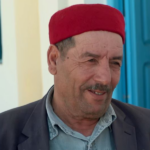 Every year, thousands of people make their way from Africa to Europe to flee from poverty, war, discrimination and climate catastrophe. During some periods up to 2,000 people arrive in Lampedusa in a single day (Der Standard, 11 May, 2021). The frequently deadly borders of Fortress Europe are made up of the Atlantic Ocean around the Canary Islands, the Greek border at the Evros river and, above all, the Mediterranean Sea. People on the move are used by politicians for geostrategic purposes (Deutschlandfunk, 29 December, 2021), pushed back by coast guards (Graf 2021), exploited by farmers (globalslaveryindex.org) and interned in camps (Arte TV, 1 December, 2021). But there are also solidarity initiatives and self-organisation by migrants and individuals like Mohsen Lihidheb, who draw attention to the structures of exploitation and push for change to the migration regime.
Every year, thousands of people make their way from Africa to Europe to flee from poverty, war, discrimination and climate catastrophe. During some periods up to 2,000 people arrive in Lampedusa in a single day (Der Standard, 11 May, 2021). The frequently deadly borders of Fortress Europe are made up of the Atlantic Ocean around the Canary Islands, the Greek border at the Evros river and, above all, the Mediterranean Sea. People on the move are used by politicians for geostrategic purposes (Deutschlandfunk, 29 December, 2021), pushed back by coast guards (Graf 2021), exploited by farmers (globalslaveryindex.org) and interned in camps (Arte TV, 1 December, 2021). But there are also solidarity initiatives and self-organisation by migrants and individuals like Mohsen Lihidheb, who draw attention to the structures of exploitation and push for change to the migration regime.
Further Reading:
*Der Standard (11.05.2021): Fluchtbewegung im Mittelmeer: Der jährliche Teufelskreis.
*Deutschlandfunk (29.12.2021): Geflüchtete an der polnisch-belarusischen Grenze. Tote im Schnee – und ein grünes Licht der Hoffnung.
*Laura Graf (2021): Pushbacks dokumentieren. Ungehorsame Beobachtungen von Grenzgewalt auf der Balkanroute.
*Global Slavery Index (2018): Country Study Germany.
*Arte (2021): Lager der Schande. Europas Libyen Deal.
OK
1500
to 1600
to 1700
to 1800
to 1850
to 1900
to 1925
to 1950
to 1975
to 1990
to 2000
to 2010
2011